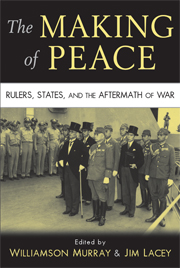Book contents
- Frontmatter
- Contents
- Preface: concluding peace
- 1 Introduction: searching for peace
- 2 The Peace of Nicias
- 3 “A swift and sure peace”: the Congress of Westphalia 1643–1648
- 4 The Peace of Paris, 1763
- 5 In search of military repose: the Congress of Vienna and the making of peace
- 6 War and peace in the post–Civil War South
- 7 Vae victoribus: Bismarck's quest for peace in the Franco-Prussian War, 1870–1871
- 8 Versailles: the peace without a chance
- 9 “Building buffers and filling vacuums”: Great Britain and the Middle East, 1914–1922
- 10 Mission improbable, fear, culture, and interest: peace making, 1943–1949
- 11 The economic making of peace
- 12 Ending the Cold War
- 13 Conclusion: history and the making of peace
- Index
- References
5 - In search of military repose: the Congress of Vienna and the making of peace
Published online by Cambridge University Press: 05 June 2012
- Frontmatter
- Contents
- Preface: concluding peace
- 1 Introduction: searching for peace
- 2 The Peace of Nicias
- 3 “A swift and sure peace”: the Congress of Westphalia 1643–1648
- 4 The Peace of Paris, 1763
- 5 In search of military repose: the Congress of Vienna and the making of peace
- 6 War and peace in the post–Civil War South
- 7 Vae victoribus: Bismarck's quest for peace in the Franco-Prussian War, 1870–1871
- 8 Versailles: the peace without a chance
- 9 “Building buffers and filling vacuums”: Great Britain and the Middle East, 1914–1922
- 10 Mission improbable, fear, culture, and interest: peace making, 1943–1949
- 11 The economic making of peace
- 12 Ending the Cold War
- 13 Conclusion: history and the making of peace
- Index
- References
Summary
Whether or no one adopts the determinist view of history, whether or no one believes that events are influenced by individuals or individuals by events, it must be recognized that the combinations of circumstances are governed as much by invisible as by visible factors, as much by the unapparent as by the apparent.
In September 1814, with Napoleon exiled to Elba and a Bourbon king installed once more on the throne of France, rulers and diplomats from virtually every European state and principality assembled in Vienna, capital of a diminished but still formidable Habsburg Empire, summoned by the victorious Allies to help settle political and territorial issues resulting from a quarter century of revolutionary and military upheaval.
This chapter offers only the barest sketch of the Congress of Vienna and the events that framed it. What took place in 1813–1815 among Napoleon's former allies and enemies – often one and the same – reflected a bewildering tangle of issues, interests, and personalities defying brief description. Nevertheless, the chapter's purpose is not to narrate that convoluted history in detail. Rather, it seeks through an examination of the Congress and what followed to address a question with more contemporary relevance: How did those who gathered in Vienna from September 1814 through June 1815 manage despite daunting obstacles to negotiate, still more actually implement, a settlement that effectively prevented great power conflict in Europe for nearly forty years and contained it for another sixty years thereafter?
- Type
- Chapter
- Information
- The Making of PeaceRulers, States, and the Aftermath of War, pp. 131 - 159Publisher: Cambridge University PressPrint publication year: 2008
References
- 1
- Cited by



